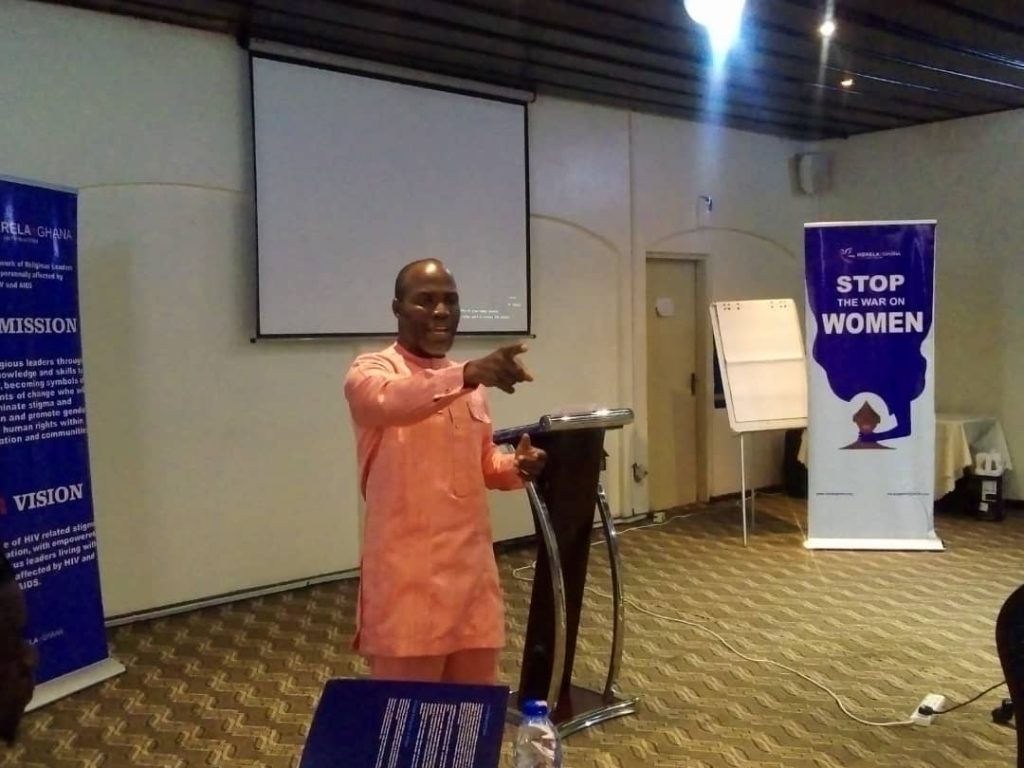Benjamin A. Commey
Accra, March 12, GNA — Reverend John Kworshie Azumah, Ghana’s HIV/AIDS Ambassador, has urged Ghanaians to encourage persons living with the Human Immune Virus (HIV) take their antiretroviral drugs rather than stigmatise against them.
He said, using the antiretroviral drugs would boost the immune system of such persons, prolong their lifespan, and help reduce infections in the country.
“The drugs are available at every district, every government hospital, polyclinics, and health centers. They can be accessed for free,” he said this at a workshop organised for selected journalists in Accra.
Antiretroviral therapy (ART) is a treatment of people infected with human immunodeficiency virus (HIV) using anti-HIV drugs.
The standard treatment consists of a combination of drugs (often called “highly active antiretroviral therapy” or HAART) that suppress HIV replication.
Rev. Azumah said the use of the drug was the surest way of preventing the virus from developing into the disease (AIDS).
Ghana has seen an upsurge in infections in recent years, especially among the younger population.
Data from the Ghana AIDS Commission indicates that a total of 18,928 new infections of the virus were recorded in the country in 2020.
In all, 5,211 of these infections were reported in young people between the ages of 15 to 24, representing 28 per cent of the total infections recorded that year.
Also, as at the end of 2020, some 346,120 people were living with HIV in the country, with a prevalence rate of 1.6 per cent.

Rev. Azumah bemoaned the continuous stigmatization of persons living with the virus, indicating that the situation had compelled many to go into hiding rather than seek early treatment.
The HIV/AIDS Ambassador who has lived with the virus for more than two decades, said he had lived that long because he had never missed taking his medication and remained healthy due to his early acceptance of the antiretroviral drugs.
He noted that due to the constant stigmatisation, many HIV persons preferred to travel miles away from their communities just to access the antiretroviral, putting them in precarious situations.
“Somebody lives in Accra but will travel all the way to Temajust to access the antiretroviral for fear of being seen and stigmatised against when they go to health facilities in their local communities for the drug. It is not helping anybody,” he bemoaned.
He also urged journalists to be more circumspect, use appropriate words when reporting on the disease to help fight stigma.
“Your description of HIV/AIDS hurts instead of giving them hope. We have to, therefore, modify our language when reporting on the virus because, if we do not do that, it means we (the media) are perpetuating stigmatisation,” he expressed.
The workshop, organised by the International Network of Religious Leaders Living with or personally affected by HIV and AIDS (INERELA+ Ghana), with funding from the UN Women, was aimed at sensitising journalists on their role in addressing HIV stigmatisation in the society.
It was also aimed at empowering them on how to use the pen to save lives.
Nana Yamfoah Amua-Sekyi, Director, Public Education at the Commission on Human Rights and Administrative Justice (CHRAJ), said journalists had a responsibility to protect the identity of children when reporting on matters that affected them.
“Do not publish a story or any image which might put the child, siblings or peers at risk even when identities are changed, obscured or not used,” she urged.
Mrs Paulina Louisa Essel, a certified Counselling Psychologist at CHRAJ, also urged journalists to be careful when reporting on sexual and gender-based violence, bearing in mind the need for accuracy.
“Not every sexual assault is rape so, use the right language when reporting on such incidents,” she added.
GNA